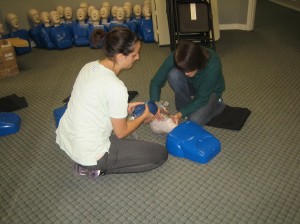PALS training courses

Pediatric Advanced Life Support (PALS) is an Advanced Life Support class for healthcare providers. ALS programs teach trainees how to give CPR to a victim in a controlled healthcare environment such as a hospital or clinic. The ALS curriculum uses the concept of Basic Life Support and medical interventions as a way to address cardiac arrest. Arrest can be caused by a number of reasons, the most common being a pre-existing cardiac program. PALS training is a two-day course, with 16 total class hours.
Cardiac arrest and CVDs
According to the WHO, the leading cause of death in the world is ischemic heart disease, closely followed by stroke. These cardiac problems are one of the biggest risk factors for getting a heart attack. CVDs are part of the ALS curriculum because of they are always in the top ten causes of death in almost all countries around the world. Trainees are taught to recognize that cardiac arrest has happened in a victim and act accordingly.
Cardiac arrest in children
While CVDs are the primary cause of arrest in adults, cardiac arrest in children is primarily respiratory in nature. This is called asphyxial arrest. When children experience respiratory problems and eventual failure, the resulting lack of oxygen causes a cardiac arrest. This makes ventilatory support one of the prime interventions done during PALS.
Giving CPR to children
When chest compressions are given to a person, the chest is depressed by a third of the chest’s AP (anteroposterior) diameter. In infants, the chest is depressed with two fingers, either the pointer and middle finger or both thumbs with the hands encircled around the chest, by at least 4 cm. For toddlers and younger children, only one hand is used to depress the chest by at least 5 cm.
Credentials for PALS training
Our PALS training program is a certification course that awards students with a PALS training certificate. Training credentials need to be renewed every two years to make sure that the rescuers skills and knowledge are updated. If you let your credentials expire, you cannot renew them through a re-certification class and will have to retake the entire PALS program. PALS re-certification is five to six hours long.
Signing up
We are located in six cities spread out over the country in five states. You can sign up for the one nearest you in person or over the provider websites. Our training providers can be found in the following locations.
- Los Angeles, California
- San Francisco, California
- Honolulu, Hawaii
- Las Vegas, Nevada
- Portland, Oregon
- Seattle, Washington
Our locations all offer the same classes as each other, at the same rates. Schedules may very but all of the programs have the same quality and are taught by certified rescuers. We encourage trainees to enrol in person or over the telephone, especially if they have any questions regarding application or certification.